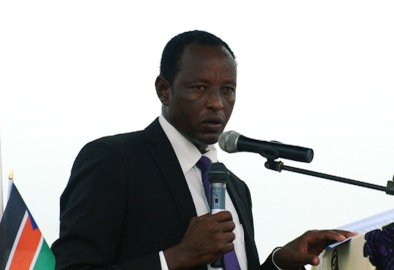Tonj state new governor appoints cabinet ministers, advisers
February 29, 2016 (JUBA) – Akec Tong Aleu, governor of the South Sudan’s newly created tiny Tonj state, curved from former Warrap state, has issued orders appointing his cabinet ministers and advisers, ending months of political campaigns and lobbying among politicians for various positions.

The appointment of the cabinet members followed the recent appointment of deputy governor and selection of the speaker of the state legislative assembly.
Governor Aleu, according to the order announced on Monday, appointed Andrew Kuac Mayol as advisor on political affairs, Mario Awuoc as security advisor and Kon Bol as peace and reconciliation advisor in the state.
Other officials include Atek Madhar, minister of local government, James Macok Deng Arol as minister of finance, and Madit Malek as information minister. Sabisa Awut is appointed the minister of education and James Gabriel as the minister of agriculture. Daniel Makol Dhal is appointed commissioner of the headquarters.
The health portfolio has been filled by a nominee from the South Sudan Democratic Forum (SSDF) party to represent other political parties operating in the state.
It is not clear if a state ministerial position is left vacant for the armed opposition faction of the Sudan People’s Liberation Movement (SPLM-IO) under the leadership of the first vice president designate, Riek Machar, which is supposed to get 15% in each state of Equatoria and Bahr el Ghazal regions.
Other states such as Jonglei, which is supposed to allocate 40% of ministerial positions to SPLM-IO, have not also indicated the states executive power sharing portfolios among parties per the August 2015 peace agreement.
Tonj state is one of the controversial 28 states created in October last year unilaterally by president Kiir’s establishment order, but the 28 states may soon be suspended as soon as a new transitional unity government is formed in Juba.
The creation of the 28 states has been widely challenged as unconstitutional by coalition of political parties in South Sudan as well as by communities who feel the order has annexed some ancestral and historical lands to other communities, particularly members of the Dinka ethnic group in greater Upper Nile region and in Western Bahr el Ghazal state.
Observers point out that the appointments of cabinet ministers, advisers, county commissioners; speakers of the local legislative assemblies as well as continuing to unilaterally operationalize the establishment order undermine the communiqué of the Intergovernmental Authority on Development (IGAD), a regional bloc comprising eight member countries, which mediated an end to the 21 months long conflict in the country.
The communiqué calls for suspension of the operationalization of the order creating the 28 states until an inclusive boundary commission is established by a transitional government and to complete its work to reach a consensus on a number of new states to be created within a month from formation of the government.
According to the IGAD February communiqué, in case of disagreement within the membership of the commission, the parties should revert to the 10 states provided for in the peace agreement.
(ST)
